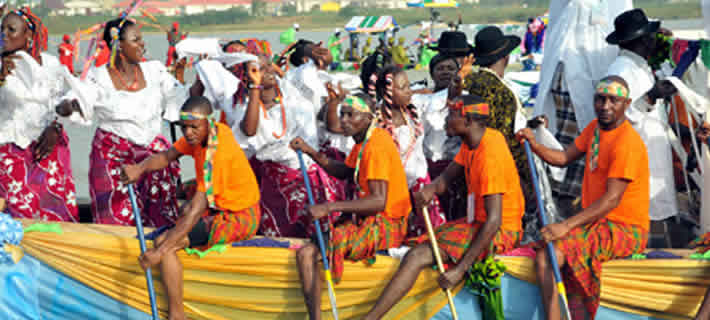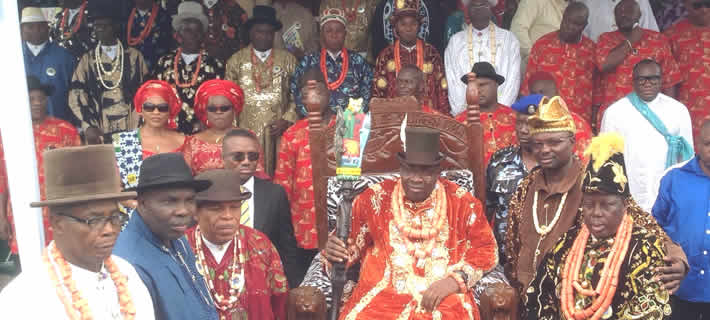There is no single written record which tells of the history of a contiguous area now occupied by the Ijaw people but its components have oral, and some written folklores indicating their origin. From Mr. D.B. Partridge’s Reports, “Investigation into the Role of Chiefs in the Midwestern State - Division Report in respect of Western Ijaw Division”, paragraph 17-18, we have the following accounts:
While the origin of the ljaws as a people is not known and a good number of it must await the findings of anthropologists, historians, and scholars of other associated disciplines, an attempt will, nevertheless, be made in what follows to suggest broad patterns for the ethnic group ‘ljaw’ (or Ezon) and a clearer focus given to the history of the component clans of the Western Ijaw Division. One common point for all scholars in respect of the Ijaw people is that they are the undisputed aborigines of the Niger Delta which, owing to its many problems could not have been a coveted habitat for others. Hence the ljaws were free to live in a world of their own until the white man came in from the sea. In this regard, Talbot assigns a Paleolithic origin to the Ijaws. The puzzle, therefore, is from where did the Ijaws migrate to occupy the Niger Delta ‘vacuum’? One theory is that over-powered by successive waves of invaders from the geographical north, the Ijaws were forced to move deeper and deeper into the south until they reached the land which no man desires and after which ‘The great sea’ begins. Having thus completed the exodus southwards, it would appear the next move was expansion westwards from the eastern delta to the western delta of the River Niger as the population multiplied. This secondary wave of emigration would appear to be supported by the fact that the traditional institutions of the primary emigrants, ‘the Eastern Ijaws) who had the survival need of integration and presentation of a united front, are more clearly defined and more widely embracing than the inchoate or fluid ones of the western Ijaw Division whose society is primarily segmentary, revolving prominently around the family and vaguely around the fishing village or hamlet.

Ijaw cultural dance
In support of these theories of Benin Origin, His Highness P.O. Kalaaama VII of Akugbene in his welcome address on l7th March, 1982 to Omo N’Oba, Uku Akpolokpolo, Oba Erediauwa (during his “Thank You Tour of Bendel State” after his coronation on 23rd March, 1979), said in parts as follows:
“The origin of the Kalanama pereship (Kingship) could be trace to Benin. In brief, Kalanama migrated from Ogobiri where he had lived with his father, Mein and founded Akugbene along the Forcados River. There was no trace of human habitation then along the river and Kalanama was joined by five of his half brothers from Ogobiri. Kalanama had the strong desire to obtain sanction to rule the area from the Oba of Benin who was then regarded as the accredited ruler of the World. In spite of the difficult conditions Kalanama bravely made his visit to the Oba who crowned him as ‘Pere’ (King) and he did return with symbols of Office and valuable articles. This great visit of Kalanama to Benin took place in the thirteenth century. When Kalanama had returned from Benin with reputation for valour and with the title of ‘Pereship’ he was proclaimed as the ruler of Mein Clan with Akugbene as the headquarters. But when Kalanama was infirmed by advance age he gave some authority to Ngbele, his beloved half brother to rule a sub-clan and by similar way, so also Ogbolu, another half brother of Kalanama ruled another sub clans Ngbelebiri Mein and Ogbolabiri Mein owed allegiance to Pere Kalanama 1 and they had to pay homage to him.
"Your Royal Highness, you can see from the foregoing undistorted history that there has been a link between your throne and that of ours and it behoves on us and your people to strengthen our togetherness. It will be recalled that during the famous visit of Kalanama to Benin the Oba also installed some chiefs for him. And hence most of our chieftaincy titles today go by BINI names. For instance we have in the Palace here: Iyasere, Azuma, Adologbo, Okugbolu and Awubia among other chiefs. It may interest you to know that during our traditional feast called “Kalanama Festival in commemoration of our Great father Pere Kalanama 1, Bini music dominates and it has just been Bini songs all the way as you and your entourage were ushered into this Kalanama square”.

Ijaw Traditional Rulers